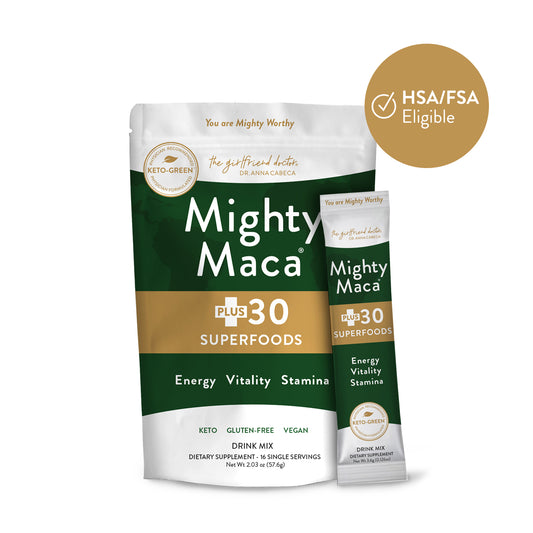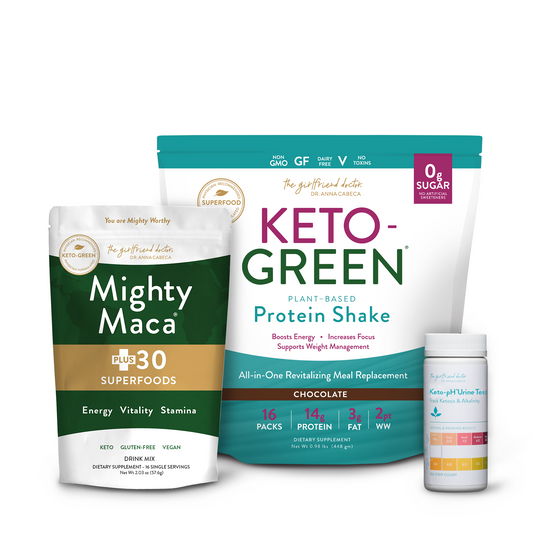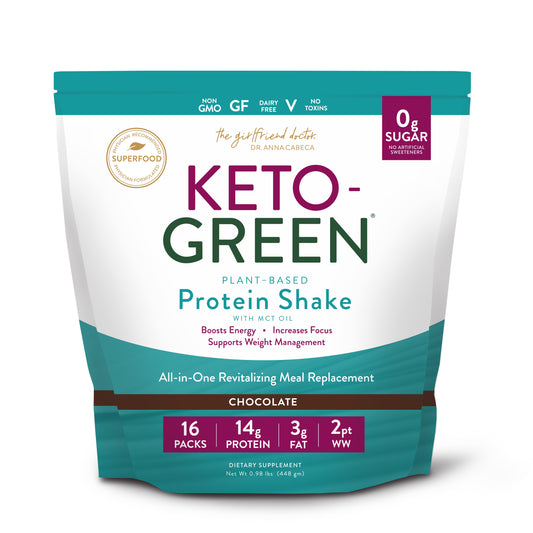Hot flashes. They’re one of those things that you can’t really and truly describe to someone who hasn’t experienced one. Turns out, it’s extremely uncomfortable when your hormones hijack your temperature regulation and jack the heat up all the way without any warning whatsoever.
What causes this odd phenomenon that seems to mostly plague menopausal women?
And most importantly, is there a way to stop hot flashes in menopause?
In this article, we’re exploring:
What do hot flashes feel like?
What causes hot flashes
The link between insulin resistance and hot flashes
How many hot flashes are normal in a day?
How to stop hot flashes
9 foods that fight hot flashes

What Do Hot Flashes Feel Like?
Hot flashes are sudden feelings of warmth. They are often intense, and they spread over the body. Usually, they are concentrated in the face, neck, and chest. These episodes can last anywhere from just a few seconds to several minutes. Sometimes, hot flashes are accompanied by sweating, a rapid heartbeat, weakness, fatigue, and even feelings of anxiety. Hot flashes are a hallmark symptom of perimenopause and menopause…but sometimes, they can also occur in younger women at different points in their cycle, and they often happen during pregnancy.
Hot flashes can also be a side effect of certain medical treatments, and they can happen in response to specific triggers like stress or spicy foods.
What Causes Hot Flashes?
Well, as with most things in the female body, the official answer to the question, “What really causes hot flashes?” is a very disappointing “We don’t really know.” (1)
For the most part, we attribute the onset of vasomotor symptoms to fluctuating estrogen levels. As menopause progresses and estrogen levels wane, your hypothalamus, the part of the brain that helps regulate body temperature, seems to overcompensate and trigger the body’s heat-dissipating mechanisms, such as sweating and increased blood flow to the skin. This results in the sudden warmth and redness characteristic of a hot flash.
You may also describe the sensation as “feeling like you’ve been suddenly set on fire.”
Hot flashes also appear to be tied to progesterone levels. You see, starting in perimenopause your progesterone levels drop — quickly. Then your estrogen levels follow suit, but they tend to drop more erratically. We often see that when we can prop up progesterone levels with bioidentical progesterone to help counteract the moments where estrogen goes wild (also known as relative estrogen dominance) hot flashes tend to ease up.
But there’s also one big factor that no one talks about when it comes to hot flashes: insulin resistance.
Insulin Resistance And Hot Flashes
Insulin resistance may play a role in the severity and frequency of hot flashes. Insulin resistance can lead to increased inflammation and hormonal imbalances, both of which are known to exacerbate hot flashes. When the body is less efficient at managing blood sugar levels, it can cause fluctuations in energy and mood, which may also trigger or intensify hot flashes. Additionally, insulin resistance is often linked with obesity, which has been shown to increase the likelihood of experiencing more severe hot flashes.
Menopausal women are particularly at risk for insulin resistance due to the hormonal changes that occur during this time. As estrogen levels decline, the body's ability to regulate blood sugar and fat distribution changes, which can contribute to weight gain and insulin resistance. This, in turn, can create a cycle where insulin resistance worsens hot flashes, and hot flashes contribute to stress and poor sleep, further disrupting metabolism and insulin sensitivity.
In one study of over 3,000 women in 2012, researchers found that night sweats and hot flashes were more frequent in women with higher levels of insulin resistance. (2) A smaller study in 2017 came to the same conclusion — the women with the most severe hot flashes in the study had the highest fasting glucose and insulin levels. (3)
And yet another study in 2018 showed that hot flashes and night sweats were associated with an 18% increase in type 2 diabetes. (4)
How Frequent Are Hot Flashes During Menopause?
One of the most common questions I get is, “Why am I getting so many hot flashes?” And many women wonder how many hot flashes a day are considered “normal.”
The truth of the matter is, that the frequency and intensity of hot flashes can vary widely. Some women experience only occasional episodes, while others may have multiple hot flashes in a single day.
The duration of hot flashes can also vary. On average, hot flashes last for about 1-5 minutes, but the overall pattern can differ significantly among individuals. Some women may experience hot flashes for just a few months, while others might endure them for over a decade. Some women continue to experience them into their 60s or even 70s.

Can Hot Flashes Cause Nausea?
While you may think hot flashes simply cause a sudden sensation of heat, they can also lead to a range of other symptoms, including nausea. Although nausea is not as commonly discussed as other symptoms like sweating or heart palpitations, many people report feeling queasy or dizzy during or immediately after a hot flash. This nausea is likely due to the rapid changes in the body's temperature regulation and the associated stress response that occurs during a hot flash.

Can Hot Flashes Cause Dehydration?
During a hot flash, the body can rapidly lose fluids through sweating as it attempts to cool down. This sudden and intense sweating, especially if it occurs frequently, can lead to a loss of fluids and electrolytes, which are essential for maintaining hydration and overall health. This is one of the big reasons you want to make sure you hydrate, hydrate, hydrate, and take your Mighty Maca® daily for the ultimate in hot flash support and electrolyte balance.

Can Hot Flashes Make You Dizzy?
Many women report feeling lightheaded or unsteady during a hot flash, which can be unsettling and sometimes even dangerous if it occurs while standing or walking.
The connection between hot flashes and dizziness lies in the rapid changes in blood circulation and body temperature that accompany a hot flash. When the body suddenly shifts from being overheated to trying to cool down, blood vessels dilate. This may cause blood flow to be temporarily reduced to the brain, leading to feelings of dizziness. Additionally, the anxiety or stress that can accompany hot flashes may also contribute to a sense of lightheadedness.

1. Add bioidentical progesterone to your routine.
Bioidentical progesterone, like the kind found in my Balance formula, can help fight estrogen dominance, a major driver of hot flashes. Your body naturally produces progesterone — but only after ovulation. So when you stop ovulating, progesterone is no longer there to calm down estrogen’s wild and crazy side.
Adding some extra progesterone to the equation works wonders. And, my Balance cream also contains pregnenolone, a ‘master’ hormone that your body uses to make other hormones, so it just gives you a lovely boost of hormone help all around.

2. Tighten up your diet to fight insulin resistance.
Insulin resistance increases as you age, so you have to begin working against it, especially if you are experiencing hot flashes. Your diet can go a long way in this regard. I always advocate for a diet high in green vegetables and healthy fats to fight insulin resistance. I call this way of eating Keto-Green® and it’s helped thousands of women across the globe lose weight, improve sleep, and even out their moods, too.
Get 11 of my best insulin-balancing recipes to get you started for FREE > HERE
9 Foods That Fight Hot Flashes
Here are 9 of my favorite Keto-Green® foods that help you fight hot flashes by tackling insulin resistance and fighting inflammation.

1. Leafy Greens
Leafy greens like spinach, kale, and Swiss chard are packed with calcium and magnesium, two minerals that play a role in hormone regulation. These greens are also rich in antioxidants, which could reduce inflammation. Try incorporating leafy greens into salads, smoothies, or as a side dish to your meals.

2. Berries
Berries, such as strawberries, blueberries, and raspberries, are high in antioxidants, particularly vitamin C, which can help reduce the inflammation and oxidative stress that might contribute to hot flashes. Berries are also fiber-filled, and fiber helps your body process excess estrogen and get it out of the body. Berries are easy to add to your diet—toss them into your yogurt, or enjoy them as a snack.

3. Fatty Fish
Fatty fish like salmon, mackerel, and sardines are rich in omega-3 fatty acids, which are all-around great for your body. Omega-3s could also support heart health and reduce inflammation. Aim to include fatty fish in your meals several times a week by grilling, baking, or even adding canned versions to salads.

4. Nuts and Seeds
Nuts and seeds, particularly almonds, walnuts, and sunflower seeds, are packed with vitamin E and nutrients that help stabilize hormones. They are also full of healthy fats that keep you feeling full. You can incorporate nuts and seeds into your snacks or sprinkle them over salads for a crunchy, nutritious boost.

5. Avocados
Avocados are packed with healthy fats, particularly monounsaturated fats, which can help stabilize blood sugar levels and support hormone health. They also contain magnesium and potassium, both of which are important for managing stress and reducing the severity of hot flashes. Add avocados to your salads, toast, or smoothies for a creamy, nutritious addition to your diet.

6. Flaxseeds
Flaxseeds are a source of phytoestrogens, specifically lignans, which help balance hormones, without raising estrogen levels. They are also filled with magnesium and fiber. You can easily add ground flaxseeds to smoothies, sprinkle them on yogurt, or incorporate them into your keto-friendly baked goods for a hormone-loving boost.

7. Mushrooms
Mushrooms are a low-carb lover's dream. They are delicious, packed with nutrients, and low in calories — while providing a nice meaty texture to just about any dish.

8. Lemons
Lemons are rich in vitamin C, a powerful antioxidant that helps reduce inflammation and oxidative stress. Lemons can also help in balancing your blood sugar. (5) The refreshing, hydrating nature of lemons also helps in maintaining overall hydration, which is crucial for managing hot flashes. You can easily incorporate lemons into your diet by adding freshly squeezed lemon juice to your water, salad dressings, or teas.

9. Coconuts
Coconuts are a wonderful and tasty source of healthy fats that are so versatile. Coconut provides essential nutrients like medium-chain triglycerides (MCTs) and electrolytes that can help with energy levels, hydration, and hormone balance. Coconut water is particularly hydrating, making it an excellent choice for staying hydrated, especially when experiencing hot flashes. Add coconut to your diet by using coconut oil in cooking, drinking coconut water, or adding shredded coconut to smoothies and desserts.
The 9 Foods That Fight Hot Flashes
There you have them, the 9 foods that fight hot flashes! These are some of my favorite, Keto-Green foods, and I hope you enjoy incorporating them into your diet.
For more Keto-Green, hot-flash fighting goodness, be sure to check out my 11-recipe meal plan for Keto-Green dieting here.
And for extra hot flash support, give Balance a try as well. I know you will love it!









